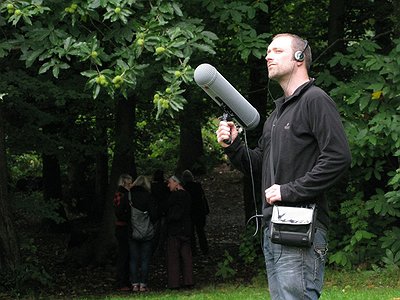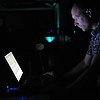Communities discovered
For part-time Bristol resident Simon Whetham, location is vital to the creative process and as a launching point in composition but when it comes to the finished result, where the sound comes from is unimportant. Whetham instead wants the significance of sonic identity to fall away for the listener who should build their own story. Sonic provenance dissipates under layers of interpretation in Whetham's compositions, taking the listener on a journey with few barriers. Since his Icelandic awakening, Whetham continues on his own journey all over the world. Since 2005 he's been connecting with a global community of musicians and sound artists creating music and projects across a variety of media and mediums. Along with leading workshops for deep listening and field recording, Whetham continues to raise awareness for the under-appreciate sounds in the world with his unique compositions.
When did you start writing/producing music - and what or who were your early passions and influences?
I began writing music when I was 17 and was heavily influenced by Jesus and Mary Chain, Velvet Underground, Loop and Sonic Youth. From there I got into grunge and also began my love for Fugazi...
What do you personally consider to be the incisive moments in your artistic work and/or career?
The trip to Iceland in 2005 was the most incisive because I discovered firstly how much I enjoyed capturing field recordings, but also discovered there was a whole community of people, globally, who were working with them in various ways.
How would you describe and rate the music scene and sound potential of the city you are currently living in and how important is it for your own work?
I am currently travelling so this question is a little difficult to answer. Regarding the town I live in which is Bristol, UK, there are a number of musicians and artists working in more abstract musics and sound, but there is no scene. It's quite disappointing, especially when I visit other cities that have a definite community that support each other and attend concerts or events. So I don't feel Bristol is important in my work at all, and don't really feel I am a part of any musical community there.
What are currently your main compositional- and production-challenges?
A good question. I am trying to find new ways of composing so I don't repeat myself too much. I say 'too much' as there will (for me) always be something similar in two works that are composed in succession, as the process is one of development. I am currently working more on my performance methods and techniques than composition, but hope that one will inform the other.
How do you see the relationship between sound and composition?
For me they are inseparable, if you work with sound, you are invariably composing – even if the sound is an end result of a process or concept. On this subject, for me personally it's the composition and end result that is of more importance than the concept or process behind the work.
What do you usually start with when working on a new piece?
I use field recordings from a specific location normally, and compose with them to recreate some of the emotions and sensations I was experiencing while going through the recording process.
How do you see the relationship between location and sound and how do you select your locations or objects of interest?
As stated above, I feel location is important. Resonances and acoustic phenomena of a location inform my work a great deal. The location is usually decided by my being there for a performance or presentation.
However, during this year I have been lucky enough to travel to many different locations and capture characteristic sounds in many countries. I am currently exploring the combinations of sounds from these locations, the common thread through them all being me and my experiences.
What will influence your decisions on how or how much to edit the material captured in the field?
Many factors influence my decisions, from deciding whether or not to keep the 'click' or the signature sound of beginning and ending a recording, to filtering out some sounds I had not even noticed whilst recording. I have to decide whether or not to boost a quiet sound or reduce a loud sound or whether to change the pitch of a recording so it works better when combined with another sound.
My work is much more about creating a mood or a journey than documentation, so if editing a sound means it sounds better as a part of a composition, then I have no problems in editing it to fit.
Without any prior information on field recordings, listeners may sometimes find it hard to determine their precise origin and context. Depending on one's perspective, this may be desirable or a problem. Where do you stand on this? Do you feel that, as part of your work, music needs to be explained or should it retain its “inexplicable nature”?
Some sounds are instantly recognisable. However, each person who hears that sound will have a different image or scene in their mind that the sound has conjured. Once you accept this, you should not try to explain exactly what the listener is hearing, as they will already have something personal to bring to the piece.
Using site-specific recordings does not necessarily mean one is documenting a location, but merely uncovering sounds or vibrations that surround the listener on a daily basis that they are not normally aware of or appreciate.






